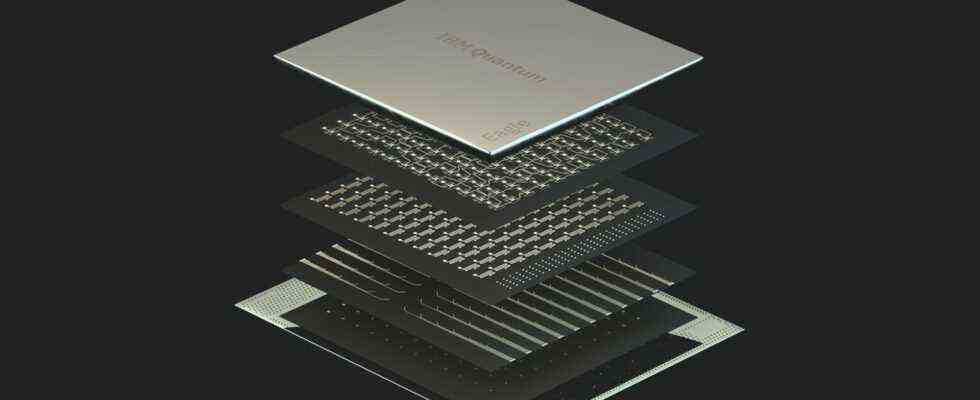background
Status: 11/16/2021 6:47 p.m.
Tech companies are racing to develop superior quantum computers. Now IBM has presented a processor whose performance data are considered to be great progress. How far is the technology of the future?
“Eagle” – this is the name of the new quantum processor from IBM. As the technology company announced, it should be significantly more powerful than previous systems. The introduction of “Eagle” can no longer be imitated by a traditional supercomputer and is “an important step on the way to the day when quantum computers can significantly outperform classic computers,” said research director Dario Gil.
Top laboratories around the world and companies such as Google or Microsoft are researching the development of the quantum computer. It is not for nothing that experts expect quantum technology to be the starting point for the next industrial revolution. In a few years’ time it will be used productively for modeling new molecules and materials in various areas – from the energy industry to drug development.
Quantum computer extremely powerful
But what is the difference between quantum computers and conventional PCs? In short: their special way of processing information. Traditional computers work with bits. A bit can only have two states: “One” and “Zero” or “On” and “Off”. Quantum computers, on the other hand, work with qubits (“quantum bits”). A qubit can not only represent “one” and “zero”, but theoretically an infinite number of states in between – and at the same time.
In other words: “In a quantum computer, information is stored according to the laws of quantum physics. This means, among other things, that data records and storage locations can have several values at the same time,” explains Frank Wilhelm-Mauch, who has been researching quantum computers since 1999 tagesschau.de.
The extremely powerful quantum computers are considered to be a beacon of hope for industry and research. In the field of artificial intelligence or in the processing of big data, for example, they could help to reach new milestones. “Quantum computers have the potential to change almost every sector and help us to address the biggest problems of our time,” said IBM research director Gil.
“An important step towards quantum superiority”
Each additional qubit doubles the number of states that can be displayed at the same time, making the number a performance feature. IBM has continuously increased the number of qubis in its quantum processors in recent years. The “Canary” quantum chips from 2017 only had five qubits. In February 2020 the group presented the “Falcon” series with 28 qubits, in September 2020 the “Hummingbird” processor finally reached 65 qubits.
With the new technology, 127 qubits are now exceeding the 100 qubit mark for the first time, according to IBM. For a simulation using conventional high-performance computers, according to the US company, “more classic bits would be necessary than there are atoms in every human being on the planet”. The increased number will enable users to explore experiments and applications on a new level of complexity.
“The doubling of the number of qubits that we have here is an extremely important step towards what is known as quantum superiority,” says expert Wilhelm-Mauch. That is the threshold at which quantum computers can do more than classic computers. A quantum superiority that lies beyond the 50 qubits was already achieved in an artificial test in 2019. “Every step beyond this brings us closer to realistic applications,” says the professor at Saarland University.
Quantum computers like this one in the OpenSuperQ project at Forschungszentrum Jülich are considered to be the basis for another industrial revolution.
Image: Research Center Jülich / Sascha Kreklau
The error rate has to go down
At the same time, IBM emphasized that progress in quantum computer hardware would not only be determined by the number of qubits, but also by the performance characteristics of quality and speed. Wilhelm-Mauch also agrees: “In addition to the qubit number, the most important parameter at the moment is reducing the error rate.”
The error probability must be so small that all qubits can actually be used, according to the theoretical physicist, who has been setting up the Institute for Quantum Computing Analytics at Forschungszentrum Jülich since last year. It is difficult to predict when this will be the case. Experts like the German physicist Andreas Dewes estimate that the development of functioning quantum computers could take more than ten years.
Wilhelm-Mauch is a little more optimistic: “I assume that in five to ten years we will have processes in the chemical industry that were developed with the help of quantum computers.” After all, in ten years, most large data centers could have quantum computers, according to the expert. A magical variable for this, however, is to reduce the error by a factor of ten and also to increase the qubit number tenfold. “When there are thousands of really clean qubits, things get interesting.”
Germany is on the right track
When asked whether quantum computers will replace traditional PCs in the future, the answer is “very simple: they will never do that because they are intended for applications where high-performance computers just fail,” says Wilhelm-Mauch. Quantum computers have absolutely no added value for tax returns, e-mails or surfing the Internet.
Little by little, quantum computing is also coming to Europe and Germany. In addition to funding from the EU and the federal government in the billions, alliances for joint research work have also been formed in recent months. In mid-June, Europe’s first quantum computer was inaugurated in Ehningen near Stuttgart.
Frank Wilhelm-Mauch from Forschungszentrum Jülich is coordinating a European and soon also a large German project. “Germany has finally managed to switch from basic research to applied and industrial research,” he says. A little later than the USA, but the state programs mean that we are well on the way in this country to get involved in the industry. “We started the marathon a hundred meters later, but that doesn’t mean anything yet.”

